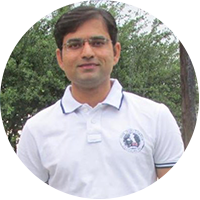5 Tracks covering 20+ sessions on technologies like Azure, Visual Studio, IoT, Blockchain etc.
As always, registration to Pune User Group's event is free.
Get all your queries solved from the 25+ industry experts present at the venue.













































So much of the digital content we create and consume every day is totally unstructured text – emails, blogs, documents, news articles, social media posts, product reviews and so on… A major challenge in the field of machine learning has been to semantically understand and then extract value from this content. This usually requires use of various text analytics techniques from the field of Natural Language Processing (NLP). In this session we will explore a couple of interesting use cases: ‘document similarity’ and ‘sentiment analysis’ by taking an 'under the hood' look at how the techniques work and walk through interesting demos for the same.
PWAs are an emerging technology that combine the open standards of the web to provide benefits of a rich mobile experience. In this session, we will discuss features like Service Worker, Push, Fetch, and Cache and how they provide benefits and help maintain functionality even under poor network conditions.
This session will help you make your own custom connectors which can be used in PowerApps, Flow or even Logic Apps. We will follow through an example where you can call Graph API endpoints from Flow or PowerApps. We will also have a brief overview of multiple authentication scenarios while registering an Azure AD app
This session will give concepts about Azure DevOps. The session will provide overview of various services offered by Azure DevOps like workitem tracking, Source control Management, Build Management, Release Management, Test Management, Packaging. It will also provide overview of licensing and costs involved in using Azure DevOps.
Story about the Cloud & Enterprise engineering group at Microsoft that encompasses products & services such as PowerBI, Azure, Visual Studio, Visual Studio Team Services, Windows Server, and System Center. It is a story about transformation of Microsoft's culture, organization structure, technology, and processes to allow enterprises to deliver faster, continuously learn, and experiment.
There are only three programming paradigms. Structured Programming, Object Oriented Programming and Functional Programming. These paradigms didn't change since late 1960s. The rules of coding are the same since 1930. This course is a brief overview of what those rules are and how the modern programming languages enable programmers to leverage these to create applications.
Come and join us to know more about Azure Cosmos DB. Most fastest, secure and scalable database in the modern cloud space of Microsoft Azure. Join us to see how to setup, configure and leverage some amazing Azure Cosmos DB features for your enterprise applications.
Azure Sphere is a secured, high-level application platform with built-in communication and security features for internet-connected devices. Explore a new class of crossover MCU’s with existing IOT devices capabilities, with a High-level OS focused on seven properties of highly secured devices. We will look at Azure sphere MT3620 and how we can get started with our secured IOT devices journey with Microsoft.
This session focuses on the Microservices' challenges and how to solve them by implementing patterns (resiliency, domain model, communications, etc.) in .NET Core and also covers packaging & deployment using Docker Containers. It showcases the eShopOnContainers (https://aka.ms/MicroservicesArchitecture) reference application we've been working on for several months.
This session will be combination of live coding and visualization of concepts as drawing on the white board. At the end of the sessions, you will have good understanding of following: 1. Different ways of creating JavaScript Objects a. Object Literals b. Constructor invocation pattern c. Object.Create() method d. Using class 2. Object Property Descriptor a. Writable b. Enumerable c. Configurable 3. What is value of ‘this’ a. Apply b. Call 4. JavaScript Prototypes and __proto__ a. Constructor b. Prototype c. __proto__ d. Prototype chain 5. Inheritance [optional] a. Prototype linking b. Creating Inheritance Having good understanding of above concept helps you to write better JavaScript application.
Take your career as a web developer to the next level with this Full-Stack Web Developer, where you’ll become an expert at front and back-end JavaScript technologies of the most popular MEAN (MongoDB, Express, Angular and Node.js) Stack. Learn to create applications from the ground up and start down one of the most lucrative and fast-growing web development career paths.
Azure Cognitive Services are a set of machine learning algorithms that Microsoft has developed to solve problems in the field of Artificial Intelligence (AI). Cognitive Services offers Language, Speech, Vision, Search, and Knowledge APIs. This session will explore some of these APIs.
Docker Compose is a tool for "defining and running multi-container applications." The tremendous power hidden in that statement allows us to use this tool in many creative ways, for development, testing, staging and even production deployment. In this session, some such use cases are described and demonstrated.
As conversational BOTs get more sophisticated, the need for custom virtual assistants that can understand your domain and taxonomy, and also ensure they don’t require crossing data boundaries has increased - perhaps indicating the start of an UX revolution! We will explore getting started and building a conversational BOT interface using Visual Studio and the BOT framework.
This session is an introduction to the new Analytics & AI PaaS solution on Microsoft Azure Cloud – Azure Databricks – a solution that helps accelerate big data analytics and artificial intelligence (AI) solutions. Azure Databricks, is a fast, easy and collaborative Apache Spark–based analytics service built on Azure. Azure Databricks provides innovation with one-click set up, streamlined workflows and an interactive workspace that enables collaboration between data scientists, data engineers, and business analysts.
This session will help you to explore Machine Learning, we will take one example and build it from scratch to understand how ML model can be trained and deployed. Deployment will be done on Azure using Azure ML services.”
